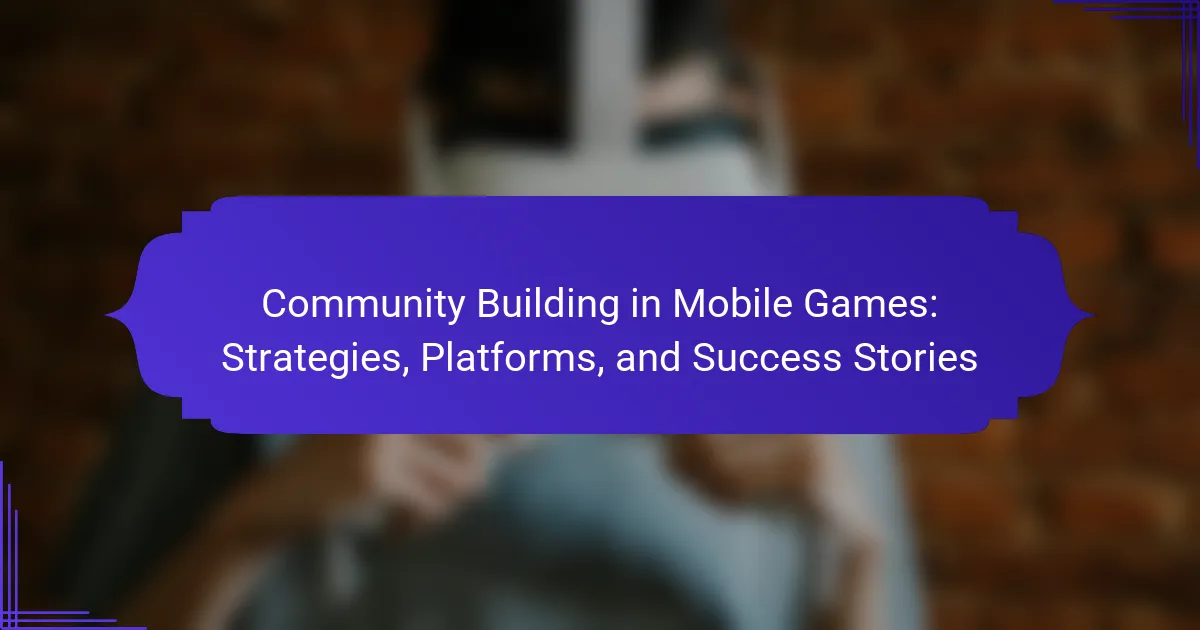Community building in mobile games enhances player engagement and loyalty while improving retention and revenue. This article explores effective strategies for fostering communities, key platforms like Discord and Reddit, and successful case studies from popular games. It also addresses challenges developers face and future trends in community engagement, including the integration of innovative technologies and social features.
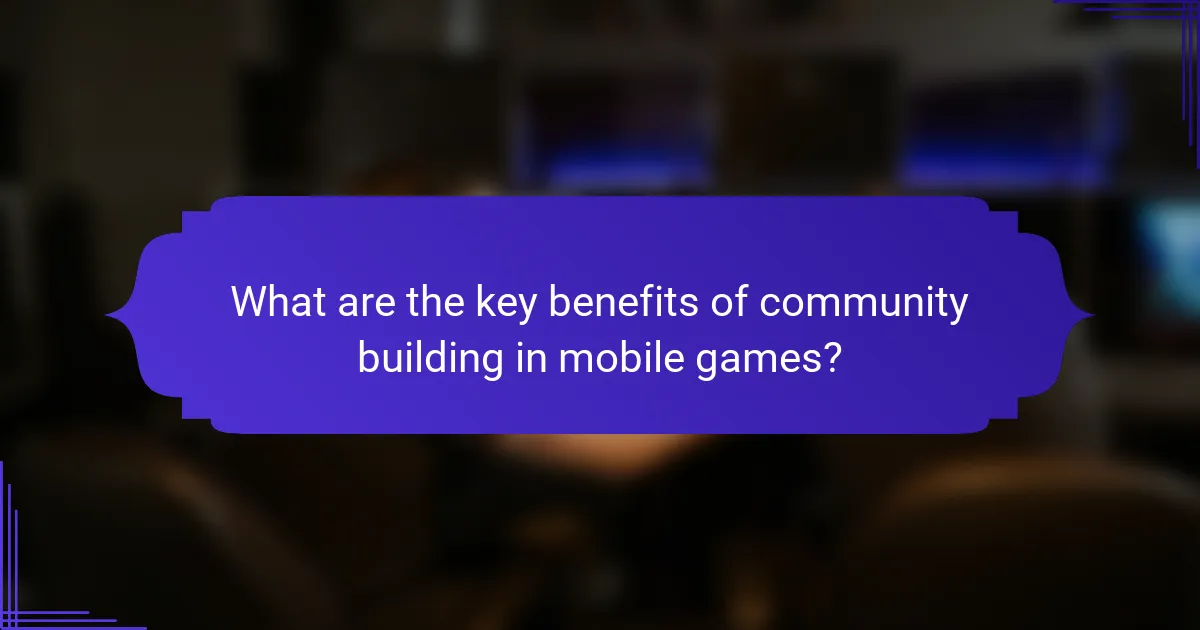
What are the key benefits of community building in mobile games?
Community building in mobile games fosters player engagement, loyalty, and enhances the overall gaming experience. Key benefits include improved player retention, increased social interaction, and a stronger sense of belonging. Engaged communities often lead to higher game revenues, as players are more likely to make in-game purchases. Additionally, community feedback can guide game development, ensuring that updates meet player expectations and preferences.
How does community engagement enhance player retention?
Community engagement significantly enhances player retention by fostering a sense of belonging and loyalty. Players who feel connected to a community are more likely to continue playing, as they enjoy social interactions and shared experiences. Engaging players through in-game events, forums, and social media strengthens these connections. For example, games that host community challenges often see increased participation and retention rates. Additionally, incorporating player feedback into game development creates a unique attribute that empowers players, making them feel valued and invested in the game’s success.
Which social features contribute to a thriving game community?
Engaging social features are essential for a thriving game community. Key features include in-game chat, forums, and social media integration. These tools foster communication and collaboration among players, enhancing their gaming experience. Regular events and challenges also encourage participation and strengthen community bonds. Additionally, user-generated content allows players to express creativity, further enriching the community.
What role do in-game events play in fostering community?
In-game events significantly enhance community engagement by creating shared experiences among players. These events foster collaboration, competition, and social interaction, strengthening bonds within the gaming community. For example, limited-time challenges encourage players to team up, share strategies, and celebrate achievements together. As a result, players feel a sense of belonging, which is crucial for long-term retention and loyalty. Additionally, unique attributes of in-game events, such as exclusive rewards and themed content, further motivate participation and community involvement.
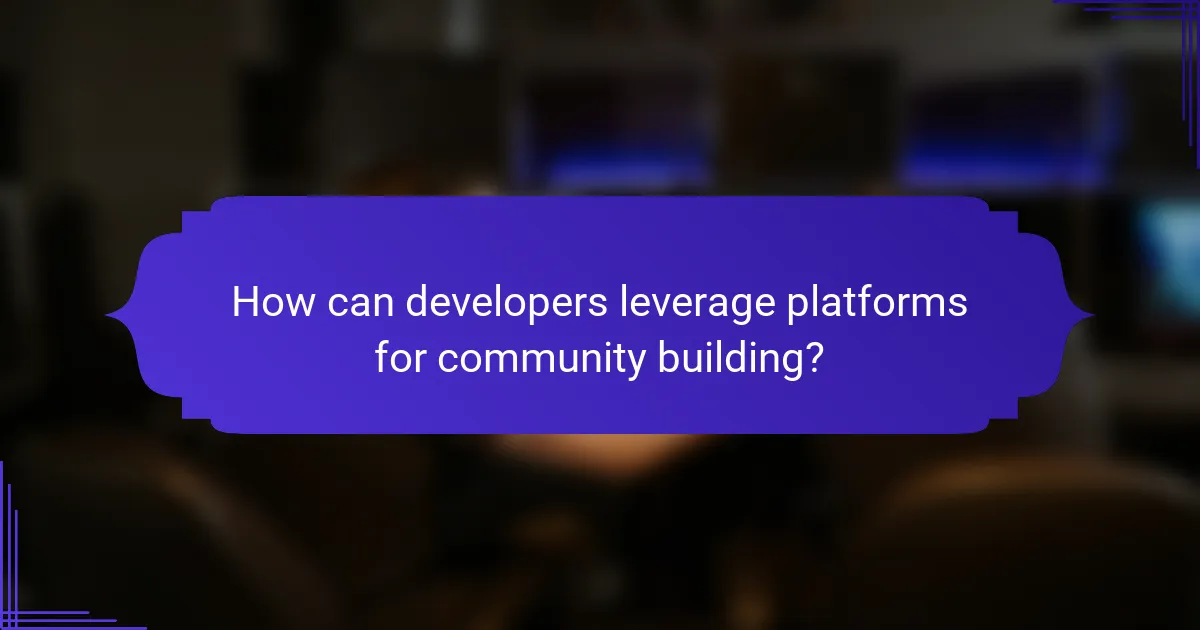
How can developers leverage platforms for community building?
Developers can leverage platforms for community building by utilizing social media, forums, and in-game features. These platforms facilitate direct interaction, feedback, and engagement among players. For instance, Discord allows real-time communication, while Reddit provides a space for discussions and sharing experiences. Utilizing these platforms enhances player retention and fosters loyalty. Engaging content, regular updates, and community events can further strengthen these connections.
Which social media platforms are most effective for mobile game communities?
Discord, Facebook, and Reddit are the most effective social media platforms for mobile game communities. Discord fosters real-time communication and engagement, making it ideal for building strong connections. Facebook offers extensive reach and group functionalities, while Reddit provides niche forums for in-depth discussions. Each platform supports unique community-building strategies, enhancing player interaction and loyalty.
How do forums and Discord servers facilitate player interaction?
Forums and Discord servers enhance player interaction by providing real-time communication and community engagement. These platforms foster connections through features like text channels, voice chats, and dedicated spaces for sharing strategies.
Players can collaborate on game tactics, share achievements, and build friendships, creating a sense of belonging. This community aspect often leads to increased player retention and satisfaction. Successful mobile games leverage these platforms to cultivate vibrant communities, encouraging user-generated content and feedback.
What are the advantages of using in-game chat systems?
In-game chat systems enhance community building by fostering communication, collaboration, and engagement among players. They create a sense of belonging and improve teamwork, leading to a more enjoyable gaming experience.
These systems facilitate real-time interactions, allowing players to share strategies and form alliances. As a result, they contribute to player retention and satisfaction. Moreover, in-game chat can help developers gather feedback, enabling continuous improvement of the gaming environment.
Overall, in-game chat systems are vital for cultivating a vibrant gaming community that thrives on interaction and shared experiences.
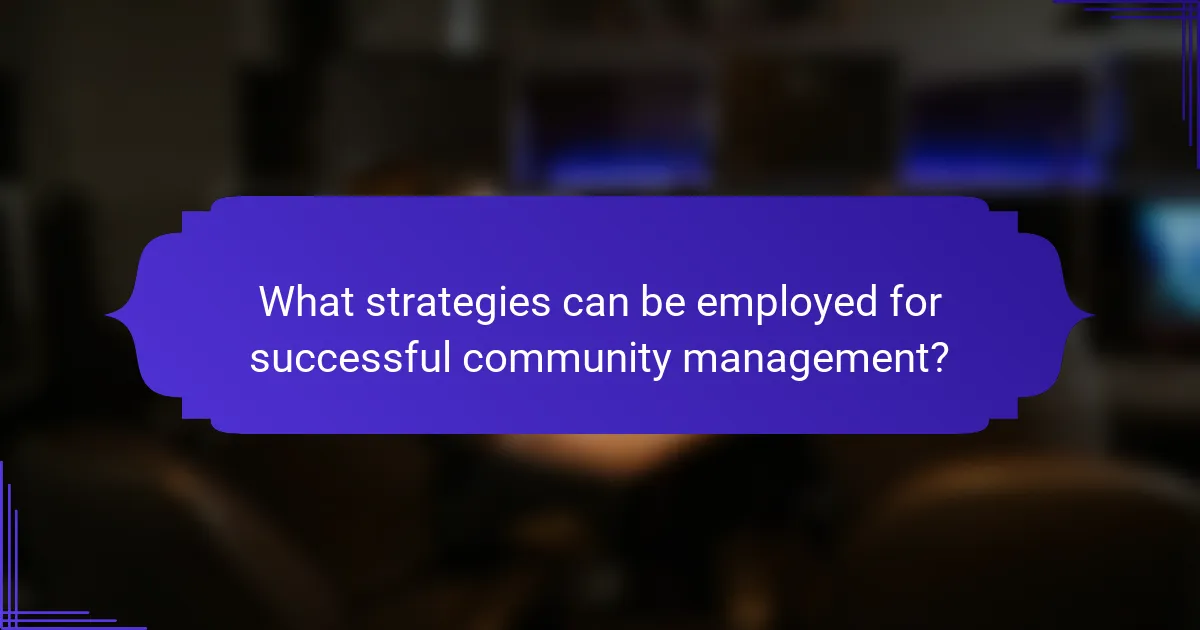
What strategies can be employed for successful community management?
Effective community management in mobile games involves strategies that foster engagement and loyalty. Utilize social media platforms for outreach, create in-game events to stimulate interaction, and encourage user-generated content to build a vibrant community. Regularly analyze community feedback to adapt and improve engagement tactics. Highlight success stories to inspire and motivate players, reinforcing a sense of belonging.
How can developers create inclusive environments for diverse players?
Developers can create inclusive environments for diverse players by implementing community-driven features and fostering open communication. They should prioritize accessibility, ensuring that all players can participate regardless of their abilities. Utilizing diverse representation in character design and storytelling enhances relatability and connection among players.
Engaging players through feedback loops allows developers to understand community needs and adapt accordingly. Regular events that celebrate various cultures and identities can promote inclusivity. Successful examples include games that incorporate player suggestions and actively address community concerns, creating a welcoming atmosphere for everyone.
What are effective moderation practices for online communities?
Effective moderation practices for online communities include clear guidelines, active engagement, and consistent enforcement. Establishing community rules helps set expectations for behavior. Moderators should actively participate in discussions to foster a positive environment. Consistency in enforcing rules builds trust and encourages members to adhere to community standards. Regular feedback and updates on moderation practices also enhance transparency and community involvement.
How can feedback loops improve community satisfaction?
Feedback loops enhance community satisfaction by fostering communication and responsiveness. They allow players to express their needs, leading to improved game features and experiences. This iterative process builds trust and strengthens community bonds. Regular feedback collection, such as surveys and forums, helps developers align game updates with player expectations. As a result, communities feel valued and engaged, which increases overall satisfaction.
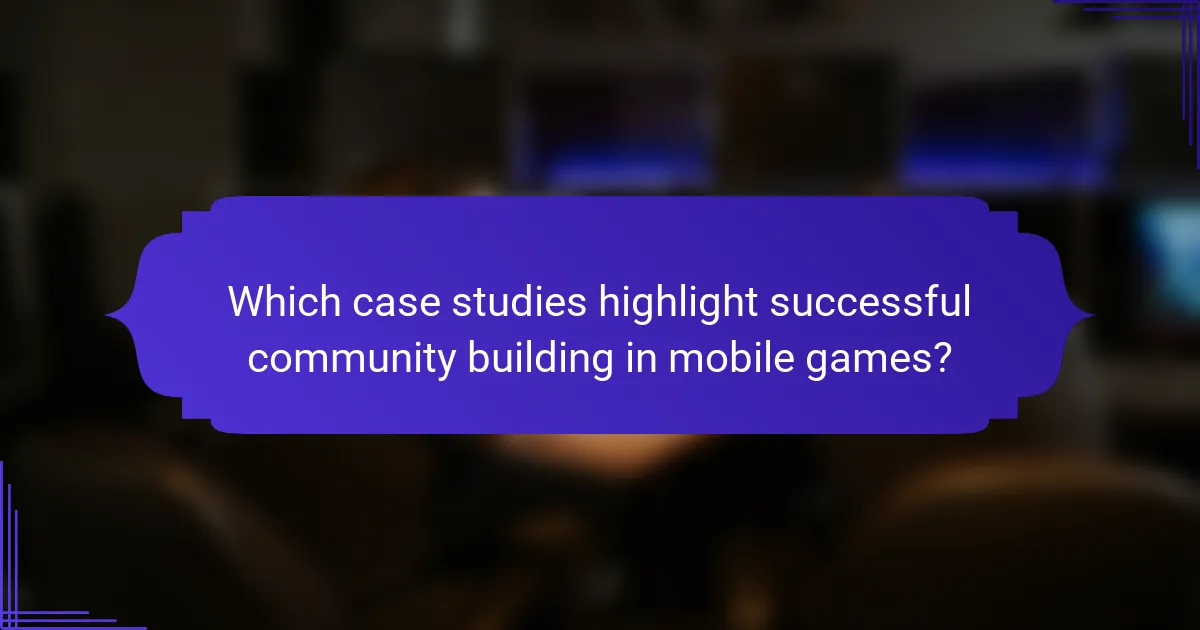
Which case studies highlight successful community building in mobile games?
Successful community building in mobile games is highlighted by case studies like Clash of Clans, Fortnite, and Among Us. These games foster engagement through social features, regular updates, and community events.
Clash of Clans utilizes clan systems to promote teamwork and communication. Fortnite engages players with seasonal events and collaborations, enhancing community interaction. Among Us gained popularity through social deduction gameplay, encouraging players to share experiences and strategies online.
These examples demonstrate that effective community building relies on interactive elements and consistent player engagement.
What lessons can be learned from top-grossing mobile games?
Top-grossing mobile games excel in community building through targeted strategies. Successful games foster player engagement, utilize social media platforms, and implement in-game events.
Engaging players through forums and chat features enhances loyalty and collaboration. For example, games like “Clash of Clans” leverage clans to promote teamwork. Social media platforms serve as vital channels for sharing updates and connecting players, exemplified by “Fortnite’s” active Twitter presence.
In-game events, such as seasonal challenges, create excitement and encourage participation, leading to increased player retention. Games like “Pokémon GO” showcase real-world community events that strengthen bonds among players.
Analyzing these strategies reveals that successful mobile games prioritize community engagement as a core attribute, driving both player satisfaction and revenue growth.
How did independent developers cultivate their communities?
Independent developers cultivated their communities through active engagement, transparent communication, and leveraging social media platforms. They fostered strong relationships with players by hosting events and encouraging feedback.
Utilizing platforms like Discord, Reddit, and Twitch, developers created spaces for players to connect, share experiences, and provide input. These interactions build loyalty and a sense of belonging among community members.
Success stories include developers who actively involved players in game development, leading to a more invested player base. For example, regular updates based on community suggestions can significantly enhance player satisfaction and retention.
What innovative approaches have emerged in community engagement?
Innovative approaches in community engagement for mobile games include leveraging social media platforms, in-game events, and user-generated content. These strategies foster interaction and build strong player communities. For example, platforms like Discord enable players to connect and collaborate, enhancing their gaming experience. In-game events often celebrate milestones or new content, driving participation and excitement. User-generated content allows players to contribute creatively, increasing investment in the game. These methods contribute to sustained engagement and community growth.
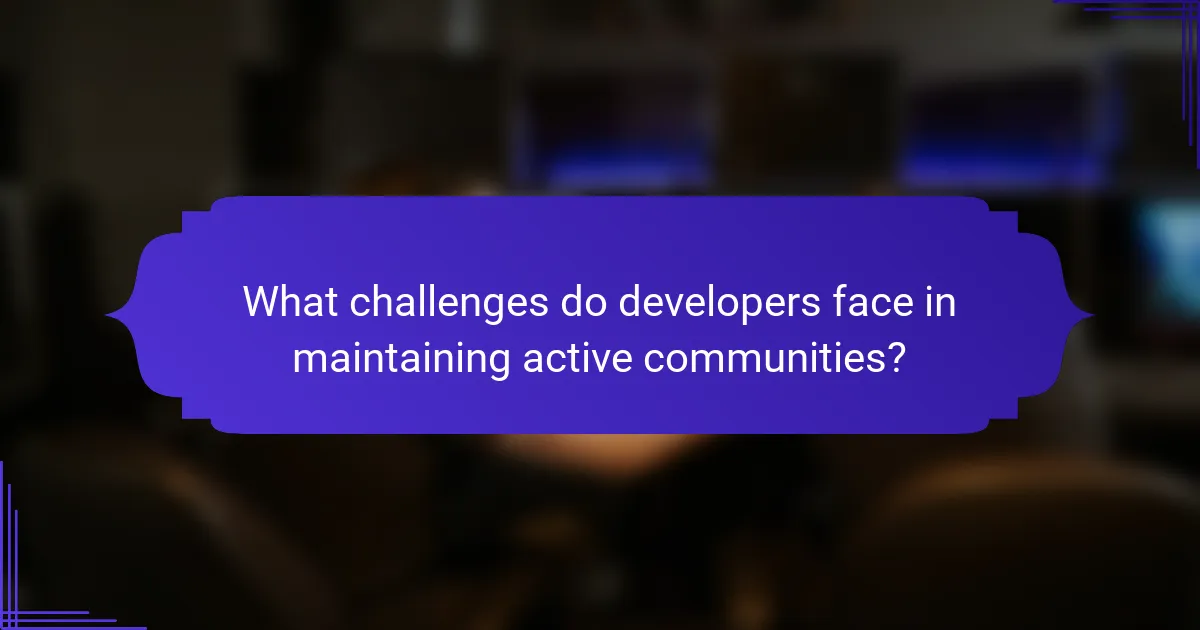
What challenges do developers face in maintaining active communities?
Developers face several challenges in maintaining active communities within mobile games. These include fostering engagement, managing diverse player expectations, and combating toxicity.
Engagement can wane over time, making it difficult to keep players active and invested. Developers must create regular content updates and events to sustain interest. Diverse player expectations can lead to conflicting feedback, complicating decision-making. Balancing the needs of casual and hardcore players is essential for community satisfaction.
Toxicity in online interactions can deter new players and alienate existing ones. Developers need to implement effective moderation strategies and promote positive behavior to cultivate a welcoming environment.
Ultimately, addressing these challenges requires ongoing effort and adaptability to evolving player dynamics.
How can developers address toxicity in gaming communities?
Developers can address toxicity in gaming communities by fostering positive interactions and implementing effective moderation strategies. Encouraging inclusive communication and establishing clear community guidelines promotes respect among players.
Regularly engaging with the community through events and feedback sessions builds trust and a sense of belonging. Implementing reporting mechanisms empowers players to address toxic behavior. Successful examples include games that prioritize player well-being, showcasing how proactive measures can enhance community dynamics.
What strategies exist for managing player expectations?
To manage player expectations in mobile games, developers should focus on clear communication, regular updates, and community engagement. Establishing a transparent relationship builds trust and helps align player perceptions with game realities.
1. Set clear goals: Define what players can expect from the game in terms of features and updates.
2. Regular updates: Keep players informed about new content, fixes, and changes to maintain engagement.
3. Feedback loops: Encourage player feedback and actively respond to it to show that their opinions matter.
4. Community involvement: Create platforms for players to connect, share experiences, and discuss expectations.
5. Realistic marketing: Avoid overhyping features or content to prevent disappointment.
These strategies foster a positive community environment and enhance player satisfaction.
How do changes in game mechanics impact community dynamics?
Changes in game mechanics significantly influence community dynamics by altering player engagement and interaction. For example, introducing cooperative gameplay can foster collaboration, while competitive elements may lead to rivalry.
Game mechanics that encourage social interaction, such as guild systems or team challenges, strengthen community bonds. These features create shared goals and experiences, enhancing player retention and satisfaction. Conversely, mechanics that isolate players can weaken community ties and reduce overall engagement.
Additionally, frequent updates to game mechanics can keep the community active and engaged by introducing new strategies and discussions. This dynamic environment promotes ongoing participation and a vibrant community culture.
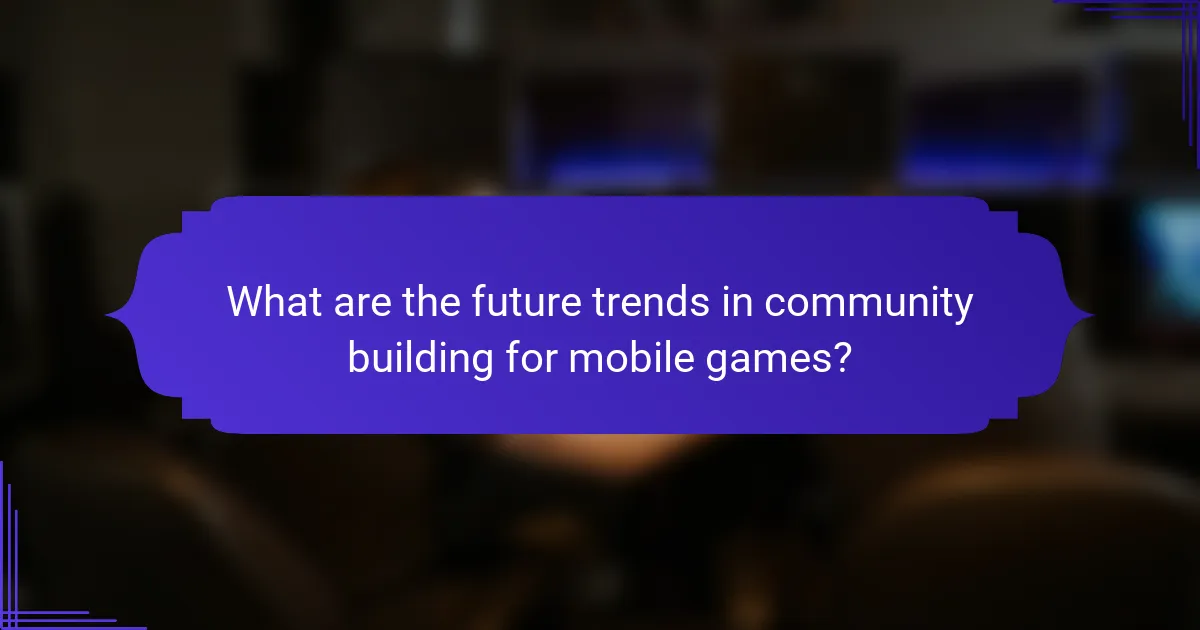
What are the future trends in community building for mobile games?
Future trends in community building for mobile games focus on enhanced player engagement through innovative platforms and technologies. Social features like in-game chat and forums will become more integrated, fostering deeper connections. Additionally, the use of AI-driven personalization will tailor experiences to individual players, increasing satisfaction. Cross-platform play will further unite communities, allowing players from different devices to interact seamlessly. Finally, the rise of virtual and augmented reality will create immersive environments, enhancing social interactions within games.
How will emerging technologies shape community interactions?
Emerging technologies will enhance community interactions by fostering connections and engagement in mobile games. These technologies create immersive environments, allowing players to build relationships through shared experiences.
Platforms like Discord and Twitch facilitate real-time communication, enabling players to collaborate and form communities. Success stories, such as Fortnite’s social events, illustrate how technology can transform gameplay into social gatherings.
Moreover, augmented reality (AR) and virtual reality (VR) are redefining community dynamics, providing unique spaces for interaction. These technologies allow players to experience a sense of presence and belonging, deepening their engagement with the game and each other.
As a result, the future of community building in mobile games will increasingly rely on these innovations, creating richer, more interactive experiences that unite players across the globe.
What role will user-generated content play in community engagement?
User-generated content significantly enhances community engagement in mobile games by fostering interaction and collaboration among players. It encourages players to share experiences, strategies, and creativity, creating a vibrant ecosystem. This content can take various forms, including fan art, gameplay videos, and forums. These contributions not only strengthen community bonds but also provide valuable insights for developers. Engaging with user-generated content can lead to increased player retention and loyalty, as players feel more invested in the game’s community.
How can data analytics drive community strategies?
Data analytics can significantly enhance community strategies by providing insights into player behavior and preferences. Analyzing user data helps identify trends, enabling tailored engagement strategies. For instance, metrics on player retention can inform targeted communication efforts, fostering a stronger sense of community. Moreover, data-driven decision-making allows developers to create events and features that resonate with players, ultimately boosting satisfaction and loyalty. This strategic use of analytics ensures communities thrive in mobile games, driving long-term success.
What best practices should developers follow for sustainable community growth?
Developers should prioritize community engagement, transparency, and feedback integration for sustainable growth. Building a welcoming environment encourages player retention and participation.
1. Foster communication through forums and social media channels to create a sense of belonging.
2. Implement regular updates based on player feedback to show responsiveness and adaptability.
3. Encourage user-generated content to enhance creativity and investment in the community.
4. Organize events and competitions to boost interaction and excitement among players.
